Beet juice may help support healthy blood pressure, improve exercise performance, and promote overall circulation thanks to its naturally high nitrate and antioxidant content. These benefits make beet juice a popular wellness drink among people looking to support heart function, boost stamina, or add more nutrient-rich foods to their diet.
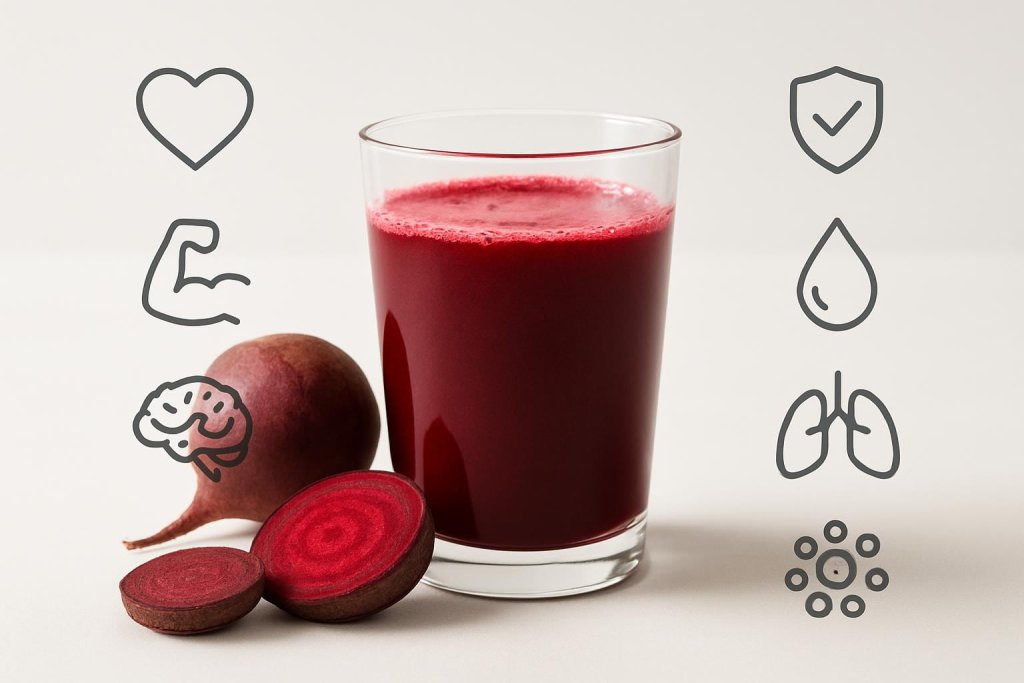
Understanding how beet juice works—and who should use it cautiously—is essential for safety, especially because it is concentrated, high in natural sugars, and rich in oxalates. This guide explains the research-backed benefits, nutrition facts, safe intake tips, and possible side effects so you can make an informed choice.
For additional safety information, visit resources such as the American Heart Association and Harvard T.H. Chan School of Public Health.
What Is Beet Juice? (Overview and Nutrition Profile)
Beet juice is a concentrated beverage made by extracting liquid from raw red beets, creating a naturally nutrient-dense drink rich in nitrates, antioxidants, vitamins, and minerals. Because juicing removes most of the fiber, beet juice delivers higher concentrations of beneficial plant compounds per serving compared to whole beets. This makes it popular for heart health support, exercise performance, and general wellness.
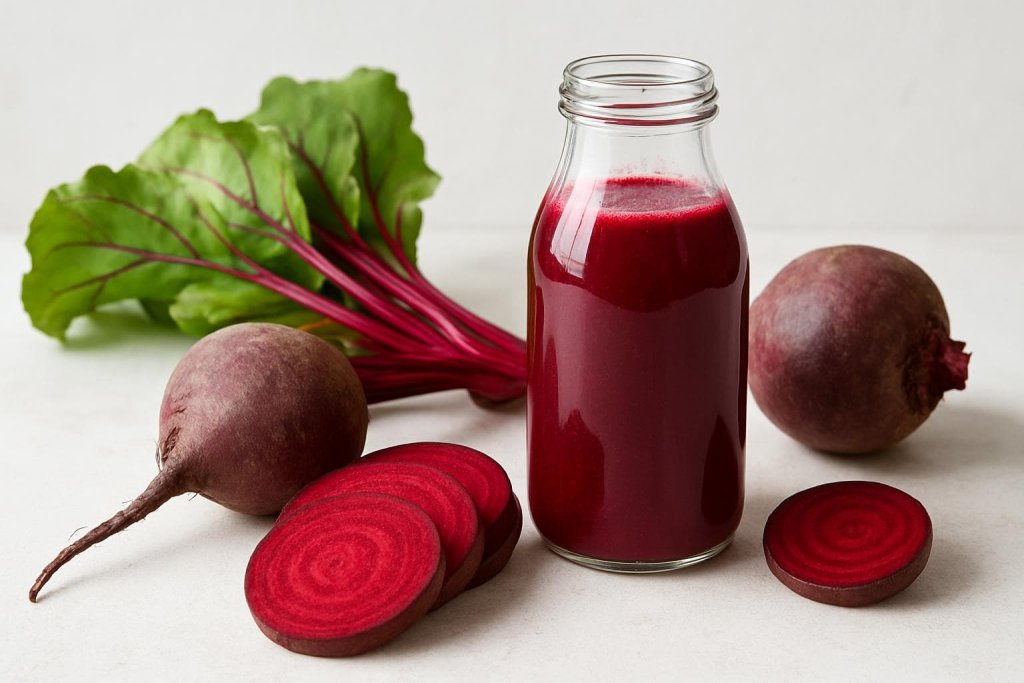
Beets belong to the Beta vulgaris family and are known for their deep red color due to betalains—powerful antioxidant pigments. Beet juice is commonly consumed on its own or blended with ingredients like carrot, lemon, apple, or ginger for flavor balance.
For scientific nutrient data on beets and beet juice, see USDA FoodData Central.
Nutrition Profile (Approx. 8 oz / 240 mL of 100% Beet Juice)
(Values may vary by brand, processing method, and concentration.)
- Calories: ~62–110
- Carbohydrates: 14–24 g (mostly natural sugars)
- Protein: ~1.8–3 g
- Fat: <1 g
- Fiber: Very low (because juicing removes pulp)
- Potassium: Up to ~700 mg (supports nerve and heart function; source: NIH – Potassium Fact Sheet)
- Folate: ~16% DV (supports red blood cell formation)
- Copper: ~24% DV
- Vitamin C: Small amounts
- Nitrates: High — supports nitric oxide production and circulation
- Antioxidants: Betalains, polyphenols, flavonoids
Beet juice is especially valued for its dietary nitrate content, which the body converts into nitric oxide—a compound that supports healthy blood flow and vascular relaxation. According to Harvard T.H. Chan School of Public Health, nitrate-rich vegetables play an important role in cardiovascular wellness.
10 Science-Backed Benefits of Beet Juice (And How to Use It Safely)
Beet juice offers a concentrated source of nitrates, antioxidants, potassium, and folate—nutrients that may support heart health, endurance, and overall wellness. Below are the most researched and evidence-informed benefits to help you understand how beet juice fits into a balanced, healthy diet.
1. Supports Healthy Blood Pressure
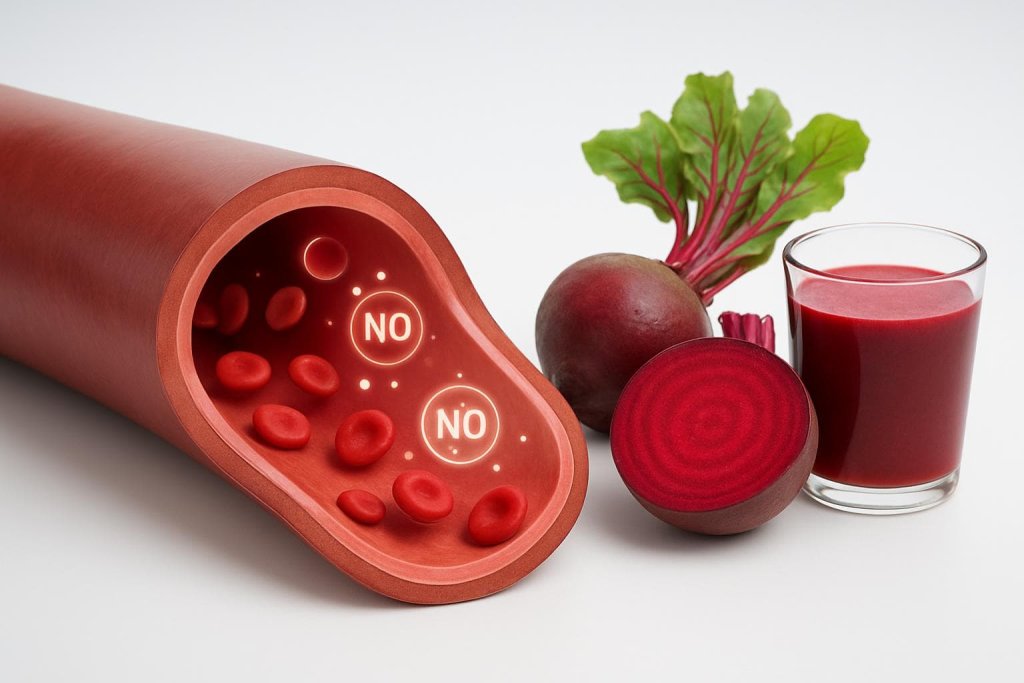
Beet juice is rich in natural dietary nitrates. When converted to nitric oxide, these compounds help relax and widen blood vessels, which may support healthier blood pressure levels. This effect is most commonly seen in people with elevated blood pressure.
Clinical studies referenced by the American Heart Association suggest nitrate-rich vegetables may help maintain normal vascular function.
For general dietary nitrate context, see Harvard T.H. Chan School of Public Health.
2. May Support Heart and Circulatory Health
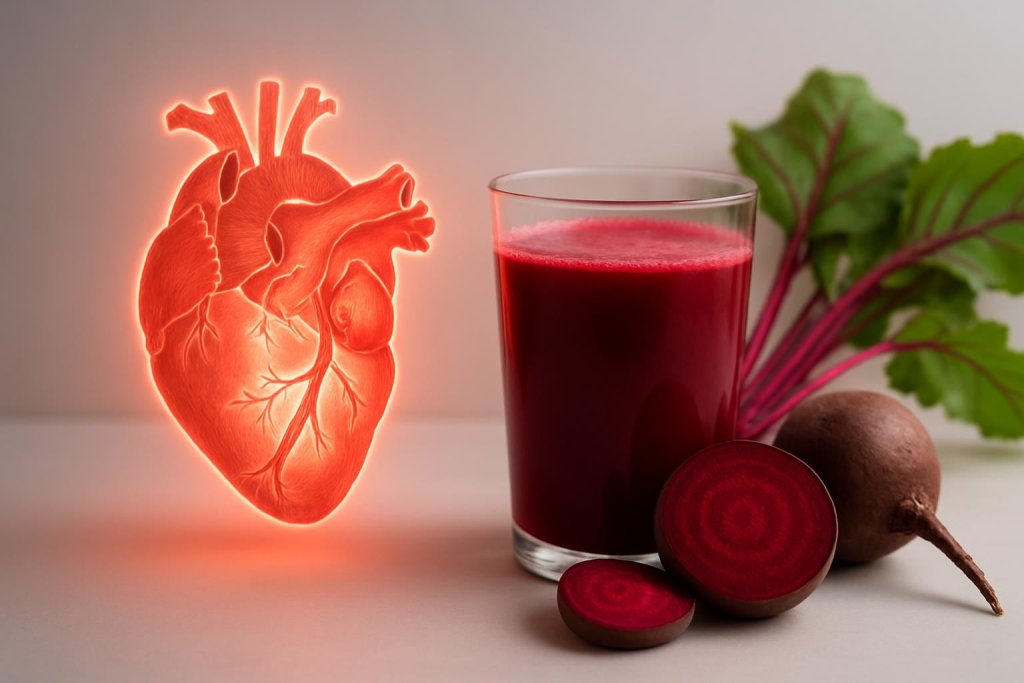
The potassium, folate, and antioxidant compounds in beet juice play supportive roles in cardiovascular wellness. Potassium helps maintain normal fluid balance and heart rhythm, while folate contributes to red blood cell formation and homocysteine regulation.
These nutrients—combined with plant nitrates—may support healthy circulation and blood vessel function. The Cleveland Clinic notes that potassium-rich foods can help support overall heart health as part of balanced nutrition.
3. Enhances Exercise Performance and Stamina

Research on beet juice and athletic performance shows that nitrates may help the body use oxygen more efficiently, particularly during aerobic or endurance activities. This increased efficiency may support stamina, exercise economy, and time-to-exhaustion in recreational and moderately trained individuals.
Beet juice is popular among runners, cyclists, and fitness enthusiasts for its potential pre-workout benefits. For general exercise and performance nutrition guidance, see NIH Office of Dietary Supplements.
4. Rich in Antioxidants That Support Cellular Health
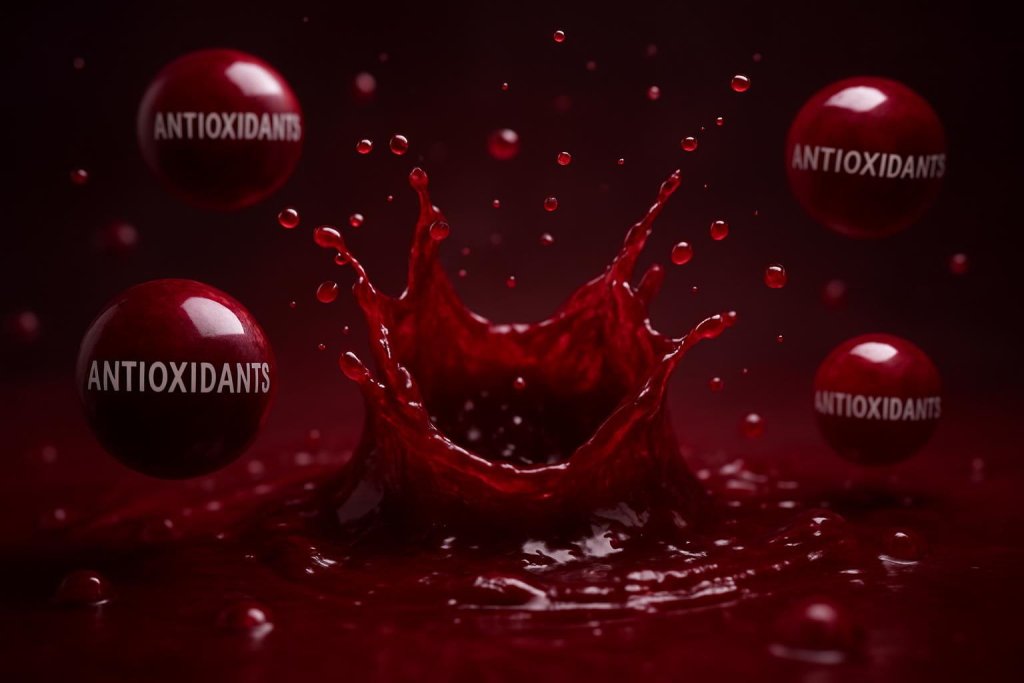
Beet juice contains betalains, vitamin C, flavonoids, and polyphenols—compounds known for their antioxidant activity. These antioxidants help neutralize free radicals, supporting cellular health and offering protection from normal oxidative stress.
According to Harvard Health, antioxidant-rich foods may help support long-term wellness through balanced inflammatory responses and cellular protection.
5. May Support Brain Blood Flow
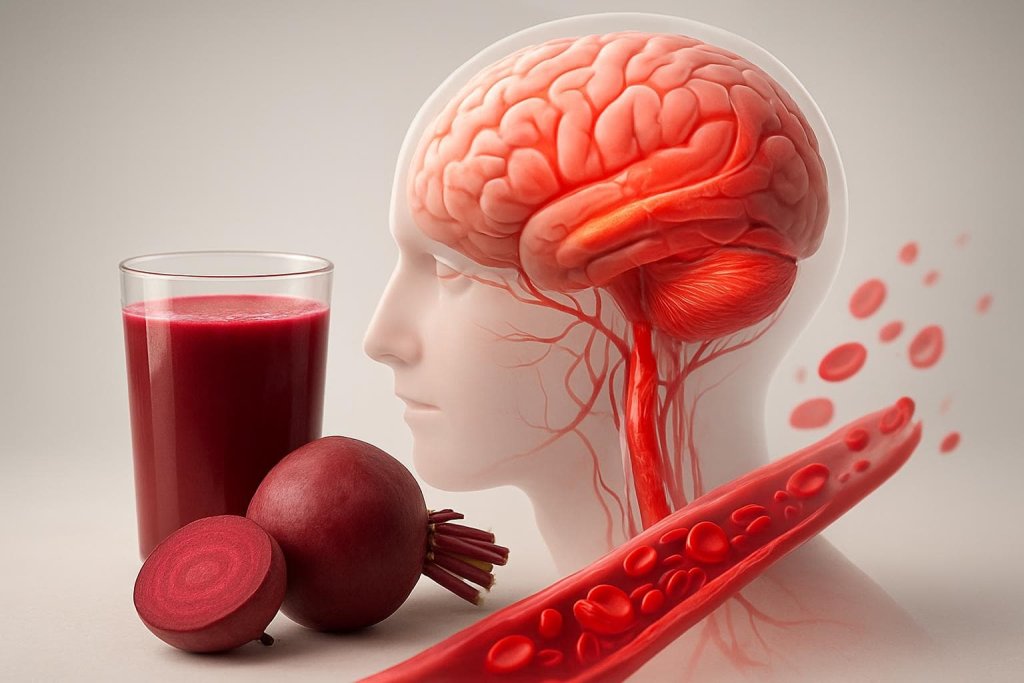
Dietary nitrates found in beet juice may help support healthy blood flow to the brain, especially in older adults. Improved blood flow may support cognitive function and overall brain wellness, although more long-term studies are needed.
Brain-health professionals emphasize that balanced nutrition and regular physical activity are key for supporting cognitive function. You can learn more about evidence-based brain health strategies from National Institute on Aging.
6. May Help Maintain Blood Sugar Balance (With Limitations)
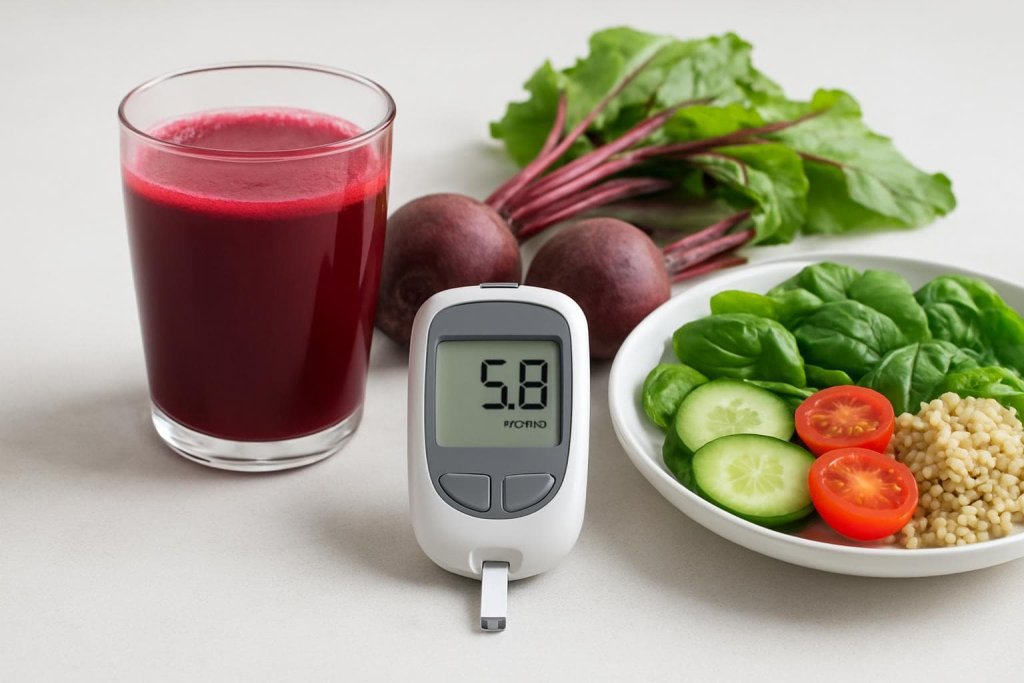
Although beet juice contains natural sugars, early research suggests that certain beet compounds—such as polyphenols and antioxidants—may support healthier post-meal blood sugar responses in some individuals. These plant compounds may help the body manage oxidative stress, which plays a role in glucose metabolism.
However, beet juice is concentrated and low in fiber, meaning it can raise blood sugar more quickly compared to whole beets. For this reason, individuals with diabetes or insulin sensitivity should practice portion control, pair beet juice with foods that contain protein or fiber, and monitor blood glucose after drinking it.
For evidence-based carbohydrate and sugar guidance, refer to the American Diabetes Association’s resource on understanding carbohydrates. This official guidance emphasizes mindful carbohydrate intake, careful selection of juices, and monitoring how different foods affect personal blood sugar levels.
This balanced approach helps ensure that beet juice fits safely into a wellness-focused, blood-sugar-aware eating pattern.
7. Supports Liver Function Through Antioxidant Activity
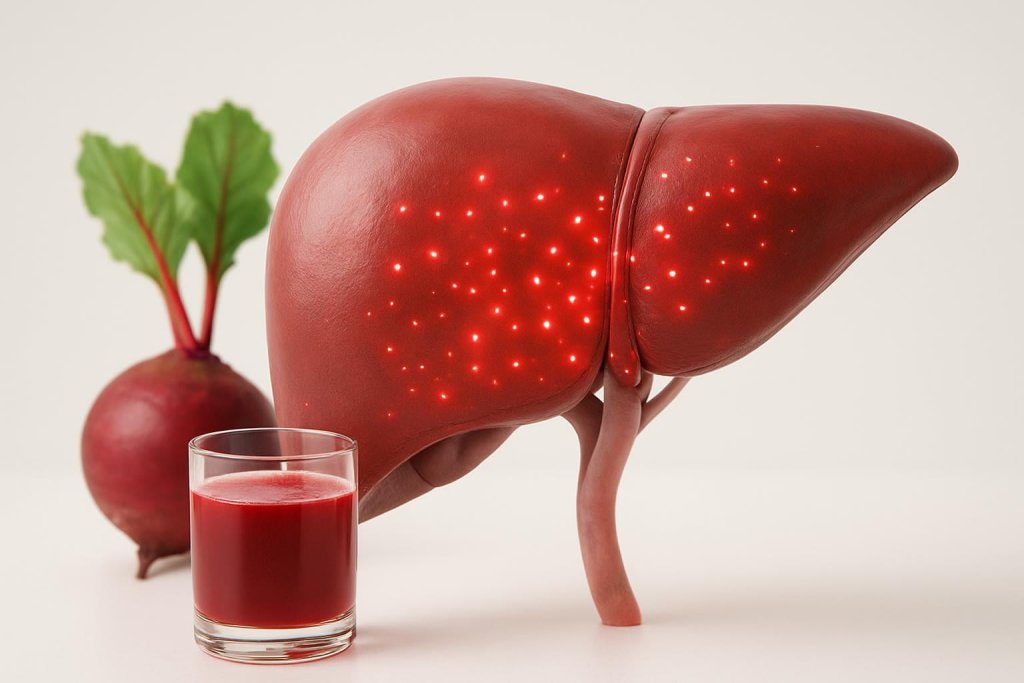
Pigments such as betalains, along with other antioxidants in beet juice, may support natural liver processes by helping protect cells from oxidative stress. These benefits contribute to overall wellness and metabolic health.
Beet juice does not replace medical evaluation or treatment for liver conditions, but it may be a helpful functional food addition. For verified liver-health information, visit the American Liver Foundation.
8. May Support Digestive Wellness
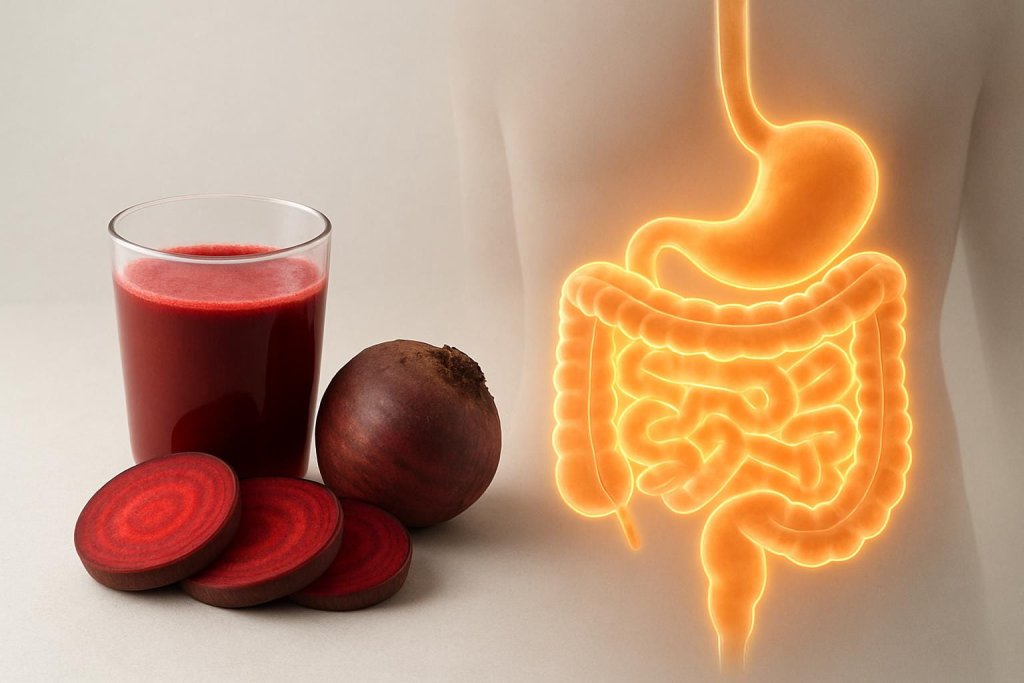
Beet juice contains natural compounds that may support digestive comfort for some individuals. While it is low in fiber, its antioxidants may support healthy digestive processes.
However, beets contain FODMAPs (fructans), which may trigger gas or bloating in sensitive individuals. Starting with small servings can help determine tolerance. For broader digestive health insights, refer to Johns Hopkins Medicine.
9. Provides Natural Energy From Nutrients and Carbohydrates

Beet juice delivers natural sugars, electrolytes, and nitrates that may provide a gentle, stable energy lift. This makes it a popular choice as a morning beverage or pre-exercise drink.
The carbohydrates offer quick fuel, while compounds like potassium and folate help support overall metabolic function. The USDA FoodData Central provides detailed nutrient profiles for beets and beet juice.
10. Provides Folate and Potassium for Daily Nutrient Support
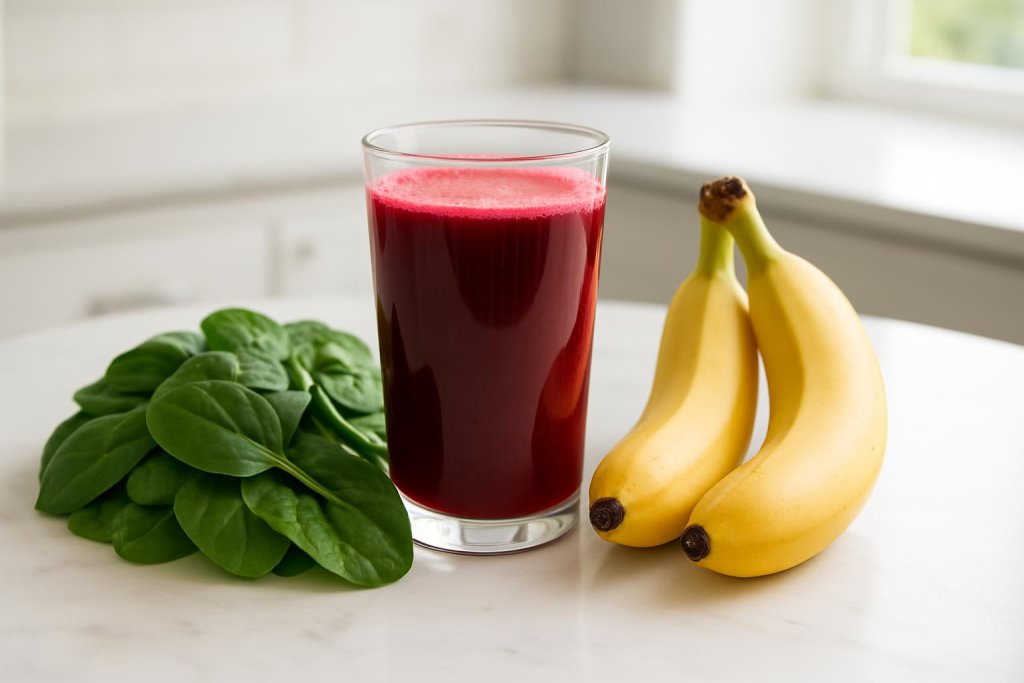
Each glass of beet juice provides folate, potassium, and other important micronutrients. Folate supports DNA formation and red blood cell production, while potassium supports fluid balance, nerve function, and normal muscle contraction.
Adding beet juice in moderation may help fill nutrient gaps, especially for individuals who do not consume enough vegetables. More information on daily nutrient needs can be found at National Institutes of Health – Nutrient Recommendations.
Possible Side Effects and Who Should Limit Beet Juice
Beet juice is nutrient-dense, but because it is highly concentrated, certain individuals should limit intake or discuss regular use with a healthcare professional. This section highlights the most important risks to ensure safety.
1. Oxalates & Kidney Stone Risk
Beet juice contains high levels of oxalates, natural compounds that can increase the risk of calcium oxalate kidney stones in those prone to developing them.
People with kidney stone history or kidney disease should avoid large amounts and review intake with a healthcare provider.
For kidney stone guidance, see the National Kidney Foundation.
2. Blood Sugar Concerns
Because juicing removes fiber, beet juice can raise blood sugar more quickly than whole beets. Individuals with diabetes or insulin resistance should monitor portions, check blood glucose after drinking, and consume beet juice alongside foods that contain protein or fiber.
For carbohydrate guidelines, refer to the American Diabetes Association.
3. Low Blood Pressure Cautions
Beet juice is naturally rich in nitrates, which support nitric oxide production and may help relax blood vessels. While this can benefit many people, those with naturally low blood pressure or those taking antihypertensive medications may experience excessive drops in blood pressure.
The American Heart Association advises individuals on blood pressure medications to maintain consistent dietary patterns and monitor symptoms such as dizziness.
4. FODMAP / Digestive Sensitivity
Beets contain fructans, a type of FODMAP that may trigger digestive discomfort in sensitive individuals. Symptoms may include gas, bloating, or cramping.
Starting with small servings (¼–½ cup) helps determine tolerance before consuming larger amounts.
For gut-health basics, see Johns Hopkins Medicine.
5. Gout & Uric Acid Considerations
Beets contain purines, which can contribute to increased uric acid levels. Individuals with gout or a history of elevated uric acid may need to limit beet juice or monitor their response.
The Arthritis Foundation offers guidance on gout-friendly dietary patterns.
6. Pregnancy & Breastfeeding Caution
Food-level beet consumption is considered safe during pregnancy, but high daily intake of concentrated beet juice or nitrate supplements has limited research.
Pregnant or breastfeeding individuals should consult their prenatal provider before drinking beet juice regularly.
See Office on Women’s Health for general pregnancy nutrition guidelines.
7. Medication Interactions (Especially BP Medications)
Because beet juice naturally supports vasodilation, it may enhance the effects of:
- Blood pressure–lowering medications
- Nitrate medications
- Certain diuretics
Anyone taking prescription medications for heart conditions, circulation, or blood pressure should get personalized advice before adding beet juice to their routine.
How to Drink Beet Juice Safely (Serving Sizes, Timing, Tips)
These evidence-informed practices help you enjoy beet juice safely while minimizing risks.
1. Recommended Serving Size
Most research uses ½–1 cup per day (120–250 mL) of 100% beet juice. This is information only—not a dosage recommendation.
2. Start with Small Servings
Begin with ¼–½ cup to assess how your body reacts, especially if you are sensitive to blood sugar changes, digestive issues, or blood pressure variations.
3. Best Times to Drink
- For exercise: 2–3 hours before training
- For general wellness: In the morning or earlier in the day
- Avoid drinking large amounts before bedtime due to natural sugar content.
4. Pair With Fiber or Protein
To help stabilize blood sugar, pair beet juice with foods like salads, eggs, nuts, Greek yogurt, or whole grains.
5. Choose Quality Products
Select:
- 100% pure beet juice
- “No added sugar” beverages
- Brands with clean, simple ingredients
For nutrient comparisons, check USDA FoodData Central.
6. Hydration Matters
Because beet juice is concentrated, drinking water alongside it helps dilute natural sugars and support digestion.
Beet Juice vs. Whole Beets vs. Beet Powder
Understanding the differences helps you choose the form that fits your wellness goals.
1. Beet Juice
- Highest nitrate concentration
- Quick absorption
- No fiber
- Can raise blood sugar faster
- Best for pre-workout or cardiovascular support
- Requires portion control
2. Whole Beets
- High in fiber
- Lower glycemic impact
- More filling and balanced
- Provide steady energy release
- Best for daily meals and digestive health
3. Beet Powder
- Shelf-stable, portable
- Often used in smoothies or pre-workout blends
- Nitrate content varies by brand
- Quality depends on sourcing and testing
For supplement quality guidance, see USP Dietary Supplement Verification.
Frequently Asked Questions (FAQs)
1. How much beet juice can I drink per day?
Most studies use ½–1 cup (120–250 mL) per day. Individuals with kidney, blood pressure, or blood sugar conditions should seek personalized advice.
2. Is beet juice good for high blood pressure?
It may support healthy blood pressure due to nitrates, but it is not a replacement for medical care.
3. Is beet juice safe for people with diabetes?
Yes, in moderation. Because beet juice is concentrated, individuals should monitor blood glucose and start with small servings.
4. Why does beet juice make urine red?
This harmless effect is called beeturia, caused by betalain pigments passing into urine or stool.
5. Is fresh beet juice healthier than bottled?
Fresh juice may contain slightly higher antioxidant levels, but bottled 100% beet juice is still a nutrient-dense option if it contains no added sugars.
6. Does beet juice detox the liver?
Beet juice does not detox the liver. It contains antioxidants that may help support natural liver processes.
7. Can I drink beet juice every day?
Yes, if tolerated—but only in moderate amounts and with attention to kidney, blood pressure, and blood sugar considerations.
Conclusion
Beet juice is a concentrated, nutrient-rich beverage that may support heart health, blood flow, endurance, and overall wellness when consumed in moderation. Because it is high in natural sugars and oxalates, individuals with kidney issues, diabetes, digestive sensitivity, or blood pressure concerns should pay close attention to servings and seek personalized guidance if needed.
This content is for informational purposes only and not medical advice.
References
- Kidney International Reports – Beetroot Juice & Blood Pressure (RCT)
https://www.kireports.org/article/S2468-0249(24)01847-3/fulltext - Harvard Health Publishing – Beets & Blood Pressure
https://www.health.harvard.edu/heart-health/a-new-way-to-beet-high-blood-pressure
